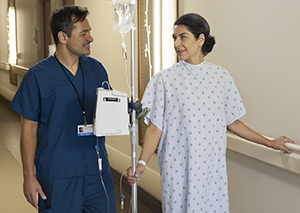Pelvic Organ Prolapse: After Surgery
After surgery for pelvic organ prolapse, you may go home the day of surgery or you may stay in the hospital for 1 day or longer. The length of your stay is based on the surgery you had.
Catheter, drain, and IV
After surgery, it may be hard for you to urinate for a few days or weeks. A thin tube (catheter) helps drain your bladder. You may have a Foley catheter, which is put into the bladder through the urethra, or a suprapubic catheter, which is put into the bladder through a small incision in your abdomen. The catheter may be removed while you are in the hospital, or it may stay in place for a few days to weeks after you go home. Tubes may drain fluid from your incision. IV (intravenous) lines give you fluids and medicines. If you have a vaginal incision, you may have gauze packing in your vagina for 24 hours.
Managing pain
While in the hospital, a nurse can give you medicine to control pain. Or you may have a PCA (patient-controlled analgesia) pump attached to your IV line. This pump lets you give yourself pain medicine. It's normal to feel some pain. But if the pain bothers you, tell your nurse right away. If you go home soon after surgery, you will have a prescription for pain medicine to take with you. Call your healthcare provider if this medicine doesn’t relieve your pain.
Getting out of bed
You may be asked to get up and walk a little before you leave the hospital. Walking keeps your blood moving and helps prevent blood clots. Once you can get out of bed, you may be helped to the bathroom to see if you can urinate on your own. When you can stand on your own, you may be able to take a shower.

When you go home
Your healthcare provider will tell you when you can leave the hospital. An adult friend or family member should drive you home. When you get home, care for yourself as instructed and schedule any needed follow-up visits with your healthcare provider.
Don't lift, do strenuous exercise or heavy housework, or have sex for several weeks. Ask your healthcare provider when you may resume these activities.
Caring for your urinary catheter
If you are still using the catheter when you leave the hospital, you may be told to:
Online Medical Reviewer:
Donna Freeborn PhD CNM FNP
Online Medical Reviewer:
Heather M Trevino BSN RNC
Online Medical Reviewer:
Howard Goodman MD
Date Last Reviewed:
8/1/2022
© 2000-2024 The StayWell Company, LLC. All rights reserved. This information is not intended as a substitute for professional medical care. Always follow your healthcare professional's instructions.